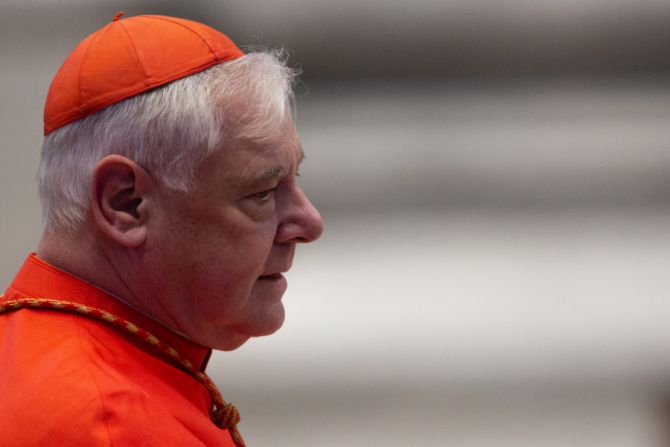Gerhard Cardinal Müller on Monday called upon the Holy Father to intervene in the German situation to correct clerics who have attempted to bless same-sex unions, or encouraged such attempts.
“For the sake of the truth of the gospel and the unity of the Church, Rome must not watch in silence, hoping that things won't turn out too badly, or that the Germans can be pacified with tactical finesse and small concessions. We need a clear statement of principle with practical consequences,” Cardinal Müller, prefect emeritus of the Congregation for the Doctrine of the Faith and himself a German, wrote in “Blessing and Blasphemy”, a May 24 essay for First Things.
“This is necessary so that after five hundred years of division, the remnant of the Catholic Church in Germany does not disintegrate, with devastating consequences for the universal Church,” he stated.
Cardinal Müller recalled that the Church of Rome has primacy not so much “because of the prerogatives of the Chair of Peter”, and certainly not as if its “occupant could do as he pleases,” but primarily “because of the pope's grave duty, assigned to him by Christ, to guard the unity of the universal church in the revealed faith.”
Speaking of the protests orchestrated by priests and bishops in Germany May 10 to bless same-sex couples and the theological impetus behind it, he said that “what we are witnessing is the heretical denial of the Catholic faith in the sacrament of marriage and the denial of the anthropological truth that the difference between men and women expresses God's will in creation.”
The former prefect of the CDF called the “staging of pseudo-blessings of homosexually active male or female couples … theologically speaking, blasphemy”, citing Pauline and Johannine epistles, Genesis, St. Thomas Aquinas, and Lumen gentium, Vatican II’s dogmatic constitution on the Church.
The nuptial blessing “cannot be separated from its specific connection to the sacrament of marriage and applied to unmarried partnerships or, worse, misused to justify sinful unions,” Cardinal Müller wrote.
“The statement of the Congregation for the Doctrine of the Faith on February 22 simply expressed what every Catholic Christian who has been instructed in the basics of our faith knows: The Church has no authority to bless unions of people of the same sex,” he said.
Cardinal Müller also argued that a human-centered view of the Church and the sacraments has become a form of elite gnosticism: “These German bishops and theologians treat the people as fools; they claim to have secret exegetical knowledge that allows them to interpret verses of Holy Scripture that condemn something contrary to nature as somehow compatible with the affirmation of same-sex unions,” he said.
That bishops and theologians are insisting on the urgency of blessing same-sex couples “beggars belief”, he commented, when “for many months believers were deprived of the consolation and the grace of the sacraments during the coronavirus.”
“This fact shows how low the dogmatic, moral, and liturgical water table has sunken.”
The attempted blessing of same-sex couples does not “signal concern for their temporal and eternal salvation,” but is rather a denial of the sacrament of marriage, he said.
Cardinal Müller suggested that German culture’s antagonism to Catholicism lies behind such attempts, and that “many believe being ‘against Rome’ is a sign of truth.”
He added that the German spirit’s tendency to idealism, by which it believes “it is spiritually and morally above the limits of what is sacramental and visible,” is a pride that “leads back into a captivity of the body and its unredeemed instincts.”
An appeal to “lived experience” as against revelation is not new to Germany, he said: “This false dichotomy drives the Christian spirit toward a new paganization that is only thinly disguised under Christian liturgical clothing.”
He noted that in the 1930s, Nazi theorist Alfred Rosenberg considered the Confessing Church at fault for holding “law, revelation, church, and creed today as dogmatically higher than the vital necessities of the German people struggling for internal and external freedom.”
The attempt to bless same-sex unions calls into question both the Petrine primacy and “the authority of God’s revelation itself,” he said.
“What is new in this theology that returns to paganism is its impertinent insistence on calling itself Catholic, as if one can dismiss the Word of God in Holy Scripture and the Apostolic Tradition as mere pious opinion and time-bound expressions of religious feelings and ideals that need to evolve and develop in accord with new experiences, needs, and mentalities. Today we are told that reducing CO2 emissions is more important than avoiding the deadly sins that separate us from God forever.”
Cardinal Müller closed his essay with a quote from Leo I, one of Francis’ predecessors as Bishop of Rome.
“And yet the Lord is particularly concerned about Peter and prays especially for Peter's faith (Luke 22:32), just as if the others would be more steadfast if the leader's courage remained undaunted. In Peter's strength all are strengthened, for the assistance of divine grace is so regarded that the strength given to Peter passes through him to the apostles,” the earlier pope had preached on the feast of Ss. Peter and Paul in 443.
The cardinal’s warning came shortly before Archbishop Samuel Aquila of Denver penned an open letter to the bishops of the world on the “untenable” views of the Catholic Church put forward by the German bishops.
Archbishop Aquila warned that the first text of the Church in Germany’s synodal path downplays the Church as God’s instrument of salvation and ignores the tensions between the Church’s mission and worldly attitudes.

